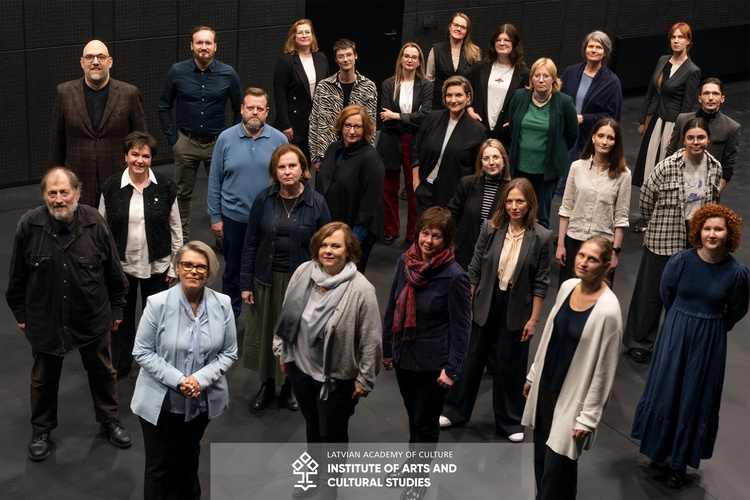
Self-Assessment of the Latvian Academy of Culture’s Research Activities: Rapid Growth, International Recognition, and Building the Next Generation of Researchers
The self-assessment report on the Latvian Academy of Culture’s (LAC) research activities for the period 2019–2024 highlights rapid growth in research: high international competitiveness, innovative research approaches, interdisciplinary cooperation, the involvement of early-career researchers, and multi-faceted social and policy impact. The self-assessment was prepared within the framework of the international evaluation of Latvian scientific institutions, organised by the Ministry of Education and Science in cooperation with the evaluation contractor “Technopolis Group” and international experts.
According to the report, the number of researchers at the LAC Institute of Arts and Cultural Studies has grown significantly – from 21 in 2019 to 40 in 2024, one-third of whom are early-career researchers, including doctoral, master’s, and even bachelor’s students. During this period, LAC researchers, supported by diverse funding sources, have implemented more than 100 research projects of various scales. Research funding attracted by the LAC has increased sixfold, reaching 2.57 EUR million in 2024. This growth is largely the result of strategic planning and targeted action: the LAC Strategy 2023–2027 prioritises research excellence, international cooperation, and engagement with the cultural and creative sector. LAC scholars work on both national and international levels, carrying out academic research as well as applied, industry-commissioned projects.
The network of LAC’s international research partners – including individual scholars, research institutions, and sectoral organisations – has expanded rapidly. Participation in international research consortia, including Horizon Europe projects and the ACE²-EU European University Alliance, enables the transfer of internationally recognised research approaches to Latvia and strengthens the Latvia's representation in the global research arena. More on LAC’s participation in international research projects: https://lka.edu.lv/en/research/. Communication of research outcomes is also significantly enhanced by the inclusion of LAC’s international scientific journal “Culture Crossroads” in the Scopus database, positioning it as a high-reputation publishing platform for both Latvian and international researchers.
LAC carries out research with tangible impact on society and policymaking – contributing not only to cultural policy development but also to the overall growth of the cultural and creative sector. LAC researchers have developed proposals to address challenges related to cultural accessibility, cultural heritage preservation and safeguarding (including museum operations), employment in the creative industries, cultural and scientific participation, the digital platform economy, and other topics linked to the resilience of the cultural ecosystem. Findings are used by the Ministry of Culture, the Ministry of Education and Science, the Latvian National Centre for Culture, cultural and arts organisations, municipalities, and international partners, including UNESCO.
In recent years, student involvement in research has increased considerably. Nurturing the next generation of researchers is recognised as one of LAC’s key development priorities as a scientific institution. The self-assessment notes that the research environment is becoming increasingly inclusive and open to students at all levels – from bachelor’s to doctoral studies. More students are participating in research projects at both national and international levels, acting as lead
researchers’ assistants, co-authors of publications, or fieldwork contributors. Doctoral students play an active role in the development and implementation of new research initiatives. A major milestone is the launch of a joint professional doctoral programme (in collaboration with the Jāzeps Vītols Latvian Academy of Music and the Art Academy of Latvia), which offers creative professionals an opportunity to undertake internationally recognised doctoral-level professional studies, developing research projects that integrate artistic and theoretical components. The LAC Strategy 2023–2027 foresees targeted support mechanisms for the growth of early-career researchers – including mentoring programmes (Young Researchers’ School), internal project competitions, opportunities for publication, and participation in conferences – fostering an environment in which students become an integral part of the research ecosystem.
At the same time, LAC is actively developing a citizen science approach, emphasising accessibility, openness, and public engagement in the research process. Through various communication platforms, the LAC promotes public understanding of the importance of science and encourages societal involvement in addressing socially significant issues. Several LAC-led research initiatives – including the National Research Programme project “The Latvian Cultural Ecosystem as a Resource for State Resilience and Sustainability” (CERS), the Horizon Europe initiative “From Sea to Street”, and the evaluation of the impact of Liepāja as the European Capital of Culture – envisage public participation as an equal research partner.
The international evaluation of scientific institutions in Latvia is carried out every six years to assess registered institutions in five main categories: research quality, impact on the scientific field, economic impact, social impact, research environment and infrastructure, and development potential. The aim of the evaluation is to improve the quality of scientific activities, enhance international competitiveness, promote integration into the European Research Area, and strengthen national competitiveness, as well as implementing an effective, evidence-based science, technology development, and innovation policy.
Prepared by
Aija Lūse
Science Communication and Public Relations Specialist
Institute of Arts and Cultural Studies, Latvian Academy of Culture

